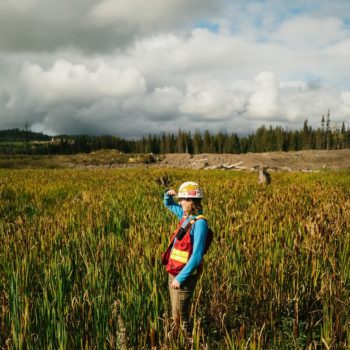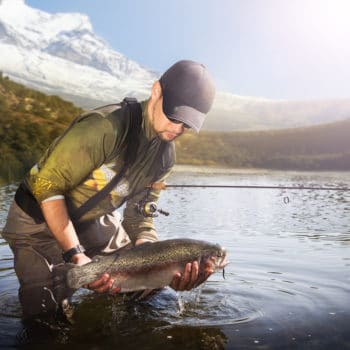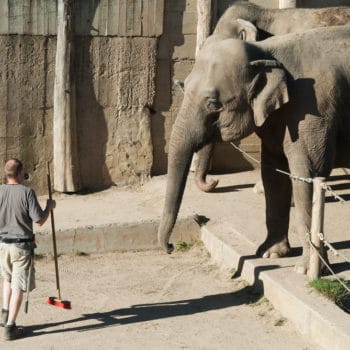Why We Love It
-
$54,970Potential Avg. Salary
-
1.6%Job Growth Rate
-
Growing DemandJob Outlook
-
Don't Take Work HomeCareer Attribute
It is a conservation officer’s primary duty to ensure that natural resources that he or she is assigned, are well protected. While some roles specifically focus on enforcing the law for fishing and hunting, others attend to the maintenance of national parks and other recreation areas.
Recommended Schools
What is a Conservation Officer?
Duties
As a conservation officer, you need to perform following tasks:
- Undertake frequent patrols of assigned areas and closely examine any complaints regarding violations of wildlife protection laws, river pollution, illegal fishing or hunting with the help of patrol trucks and boats.
- Prepare educational presentations on aquatic preservation, management of various wildlife and conservation enforcement, for speaking engagements on television and radio.
- Carry out census reviews of fish, game and boating; aggregate data on boating accidents, fish tagging and wildlife depredation.
- Perform emergency services when required and keep all park sites secure; oversee the interactions between different wildlife and humans in common grounds like roadways.
- Develop and implement a chain of custody for evidence that is collected at the time of investigating any violations of wildlife preservation laws.
Day In The Life
As a conservation officer, you will spend most of the time monitoring the sustainable use of various natural resources and natural habitats. Using your knowledge of federal and state regulations for wildlife protection, your day to day task might vary slightly depending on where you are employed.
In addition you may have to meet with local communities to educate them on responsibly using natural resources, look into any suspicious or criminal behavior, and provide support with wildlife related emergencies. Some may have to track statistics pertaining to specific animal populations, plant growth, etc. In recreational areas like camp sites or parks, you will be in charge of selling appropriate recreation permits, supplying visitors with information and assessing various equipment.
Work Schedule And Typical Hours
One of the best parts about this field, is getting to spend a lot of exciting time in the outdoors but it also results in flexible timings. Working over the weekend is quite common, along with having to travel to other sites to advise on conservation work. You may also have to travel with overnight lodging when needed.
In senior positions, your schedule will be less irregular with more administrative responsibilities at the desk, and less field work. You should be comfortable working in different types of weather for patrols in shifts at night, during weekends and public holidays.
Growth Of The Job
There are new challenges working as a conservation officer on almost a daily basis. Experienced conservation officers and game wardens, especially those who perform outstanding work, may advance to the position of a supervisor, administrator or be promoted to a field training officer. As interest in protecting natural environments increases in recent years, there continues to be a growing demand for professionals working in public conservation. However, since many of these roles require government funding, employment prospects will depend on the allotment of state, federal and local budget.
Typical Employers
Conservation officer roles can be found at national and state parks, natural habitats like forests, lakes and mountains, and international agencies.
Recommended Schools
How To Become a Conservation Officer
According to the BLS, junior conservation workers are hired with only a GED or high school diploma and a valid driver’s license, after which they enrol into on-the-job training to develop their skills. This is typically done under the guidance of a more experienced forestry or conservation officer. This type of training will include becoming familiar with the correct use of firearms, wildlife law enforcement regulations, and how to identify wildlife. While requirements for being a conservation officer differs across states, you will eventually need to complete a college degree with relevant coursework in sociology, law enforcement, criminal justice or environmental studies to qualify for promising opportunities.
Significant experience working in forestry or wildlife preservation may compensate in some cases for the lack of a bachelor’s degree. Those aspiring to be conservation officers will have to pass several tests besides having the appropriate educational qualifications, which includes physical and psychological exams. You will need to be qualified to carry a handgun and go through an extensive background check, and pass a drug test. A few conservation officers have followed the path of peace officer training via a vocational program, which is usually offered as a certificate diploma or as part of an associate’s degree.
Conservation Officer Salary Data
We’ve provided you the following to learn more about this career. The salary and growth data on this page comes from recently published Bureau of Labor Statistics data while the recommendations and editorial content are based on our research.
National Anual Salary
Low Range
$42,780Average
$54,970High Range
$76,510National Hourly Wage
Low Range
$21/hrAverage
$26/hrHigh Range
$37/hrHow do Conservation Officer salaries stack up to other jobs across the country? Based on the latest jobs data nationwide, Conservation Officer's can make an average annual salary of $54,970, or $26 per hour. This makes it an Above Average Salary. On the lower end, they can make $42,780 or $21 per hour, perhaps when just starting out or based on the state you live in.
Salary Rankings And Facts
#326 Nationally for All Careers
Programs and Degrees
Here are the most common degrees for becoming a Conservation Officer. a is usually recommended and specifically a degree or coursework that prepares you for the particular field, see below.
Highest Education Among Conservation Officers
- 0.3% Doctorate
- 3.4% Masters
- 27.3% Bachelors
- 10.3% Associates
- 30.1% College
- 25.3% High School
- 3.4% Less than High School
Job Growth Projections and Forecast
2014 Total Jobs
6,2002024 Est. Jobs
6,300Job Growth Rate
1.6%Est. New Jobs
100How does Conservation Officer job growth stack up to other jobs across the country? By 2024, there will be a change of 100 jobs for a total of 6,300 people employed in the career nationwide. This is a 1.6% change in growth over the next ten years, giving the career a growth rate nationwide of Below Average.
Growth Rankings And Facts
#562 Nationally for All Careers
What Companies Employ The Most Conservation Officers
| Industry | Current Jobs | New Jobs Needed | % Increase |
|---|---|---|---|
| State government, excluding education and hospitals | 5,600 | 100 | 0% |
| Local government, excluding education and hospitals | 600 | --- | --- |
| --- | --- | --- |















